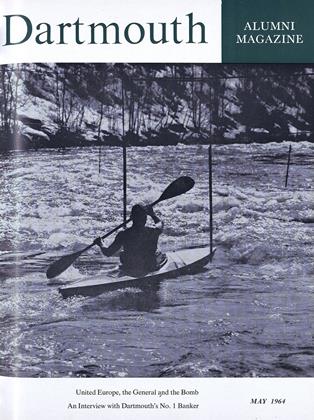By Robert E. Huke '48. Manila,the Philippines: The Bookmark, Inc.,1963. 428 pp. $3.50.
Shadows on the Land is an excellent and timely book organized and written in such a way that the reader, be he a professor, a businessman or mature general reader, will add to his knowledge and understanding of the Philippines. Why? First, because of the author's knowledge of the country as a result of his Fulbright Professorships at the University of the Philippines in 1955-56 and again in 1962-63 buttressed by war service in the Southwest Pacific, research in Burma, and extensive travels throughout Southeast Asia. Second, while Dr. Huke was teaching at the University of the Philippines, he had the opportunity to travel widely through the islands and record his observations in words, on maps and slides.
Third, the objective of the author to publish "a book for every person interested in the continued rapid development of the Philippines ... (necessitated) ... a solid background in economic geography." Thus the volume attempts to answer questions such as: What resources are available and how are they distributed through the islands? How is the resource base used today? Is it possible to improve the efficiency of resource utilization? What of the future?
The answers to these questions are presented in a clear and understandable style of writing. The first seven chapters represent the systematic approach to physical geography with individual chapters on land forms, weather and climate, soils, natural vegetation, minerals and mining industries, water resources, forests and forest industries. Two chapters deal with agriculture and land use and land ownership and credit. Individual chapters follow on rice, corn, coconut, sugar, abaca, native and Virginia tobacco, fishing and manufacturing.
Dr. Huke has skillfully combined the information gained from years of first-hand field trips and research studies and integrated his knowledge with that of specialists in universities and government positions. This is not an arm-chair-library-study text. The reader feels instinctively that Dr. Huke and the contributing writers from the Philippines have lived and worked in the geographic-economic environment of which they write.
Professor of Geography
 View Full Issue
View Full Issue
More From This Issue
-
 Feature
FeatureUNITED EUROPE, THE GENERAL AND THE BOMB
May 1964 By HENRY W. EHRMANN, -
 Feature
FeatureDARTMOUTH'S NO. 1 BANKER
May 1964 By DERO A. SAUNDERS '35, -
 Feature
FeatureA New Strategy of Liberal Learning
May 1964 -
 Article
ArticleTHE UNDERGRADUATE CHAIR
May 1964 By DAVE BOLDT '63 -
 Class Notes
Class Notes1936
May 1964 By BARRY C. SULLIVAN, GILBERT BALKAM -
 Class Notes
Class Notes1922
May 1964 By LEONARD E. MORRISSEY, CARTER H. HOYT
ALBERT S. CARLSON
-
 Books
BooksNEW PLANS FOR OLD TOWNS
April 1943 By Albert S. Carlson -
 Books
BooksSKY HIGHWAYS-GEOGRAPHY FROM THE AIR
June 1945 By Albert S. Carlson -
 Books
BooksJOURNEYS THROUGH THE AMERICAS
April 1952 By Albert S. Carlson -
 Books
BooksTHE ECONOMIC STATE OF NEW ENGLAND.
April 1955 By ALBERT S. CARLSON -
 Books
BooksTHE GEOGRAPHY OF POVERTY IN THE UNITED STATES.
NOVEMBER 1972 By ALBERT S. CARLSON
Books
-
 Books
BooksFaculty Publications
February 1933 -
 Books
BooksProfessor Roy P. Forster
November 1946 -
 Books
Books"THE PRESTIGE VALUE OF PUBLIC EMPLOYMENT,"
FEBRUARY 1930 By Charles Leonard Stone -
 Books
BooksDON ROBERTO
March 1931 By J. M. Arce -
 Books
BooksTHE SUMMER I WAS LOST.
JULY 1965 By ROBERT S. MONAHAN '29 -
 Books
BooksTwo New Davis Books Preaching On Church and Community Occasions
FEBRUARY 1929 By William Slade

